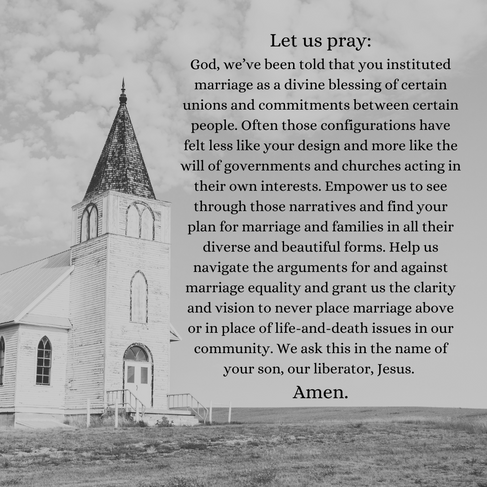Marriage
- Rev. Dr. Ben Huelskamp

- Aug 18, 2025
- 4 min read
Monday, August 18, 2025
Happy Monday, my friends! Several weeks ago, I was supposed to attend the wedding celebration for two close friends. Having dated and been engaged long enough that many of us just assumed they were already married, they decided to do a small ceremony and then hold a much larger party for friends and family at Slammers, Columbus’ prominent lesbian dive bar. For this couple and their many connections, a who’s who of Central Ohio LGBTQIA+ people, a night full of dancing, pizza, beer, and other fun just made sense. Despite convincing myself I needed to stay home for health reasons; I experienced major FOMO[1] that night.
The next morning, Siobhan and I recorded an episode for season two of “Coming Out Christian”[2] and, having gone to the same wedding, she decided to focus a bit of that episode on weddings and wedding celebrations. I admit that I’ve had my wedding planned out since I was five. Yes, the gender of my partner has changed, and the scale and scope of the celebration has become more realistic, but what hasn’t changed is my focus on the ceremony. Sure, the reception will have great food and be totally Queer, but the music, worship arts, liturgy, and preaching will be fire (hopefully my eventual partner will agree. To that end, if you are or know a good Queer man who is also looking for a good Queer man, send him my way! My mom says I’m a catch.).
From outside the LGBTQIA+ community, marriage equality probably appears to be a top priority, but inside the community there are strong opinions about whether marriage should be something Queer people pursue. Does marriage serve a purpose for Queer people? More moderate, conservative[3], and some liberal members of the LGBTQIA+ community argue, yes, legally recognized marriage is important for Queer folks because it ensures that same-sex couples have access to the same rights, privileges, and benefits as male-female couples. However, other LGBTQIA+ liberals and more radical Queer people argue that marriage forces Queer people into a system of heteronormative coupling and reinforces patriarchal and largely false Christian or biblical ideas of marriage and spousal power dynamics. As marriage equality returns to the news and the courts with at least one member of the US Supreme Court openly questioning its legality and states rushing to either sure up their laws against marriage equality or actively trying to overturn laws prohibiting marriage equality, the marriage debate has returned to the LGBTQIA+ community.
A hopeless romantic, I still believe in marriage and plan to have a wedding one day. Whether that marriage is ultimately sanctioned by the state or carries any legal, financial, or tax benefits is secondary to declaring publicly and before God that I’ve made a commitment to a person and they have made a commitment to me. Though I don’t think it’s for me, I completely support and believe that commitments between more than two partners are not only blessed by God, they’re also supported by scripture. That said, I understand the objections to pushing marriage equality within the Queer community. There is a very real concern that making marriage equality a priority further marginalizes people in the community who are facing issues far more pressing including poverty, hunger, health disparities, erasure, and death. Marriage equality and all the joy that surrounds marriages and weddings has been used as a tool of largely white Queer leaders to mask, deprioritize, and oppress other members of our community.
For my part, I believe in people making loving, equal, and consensual commitments to each other. I’m less concerned about whether those unions are state sponsored as long as they are equitable across genders, sexualities, sexual orientations, and the configurations of people in those unions. I’m still excited to plan my big church wedding with great music, amazing preaching, and the whole congregation blessing us along with the celebrants.[4] After the service and communion, which my partner and I will offer, the reception will follow at the Columbus Museum of Art or a similar venue with a local bookstore onsite. Each guest will get a ticket for one free book. If that sounds like fun, y’all need to help me find the man!
How do you think about marriage? What do you want in your wedding or what was special about your wedding?
Let us pray: God, we’ve been told that you instituted marriage as a divine blessing of certain unions and commitments between certain people. Often those configurations have felt less like your design and more like the will of governments and churches acting in their own interests. Empower us to see through those narratives and find your plan for marriage and families in all their diverse and beautiful forms. Help us navigate the arguments for and against marriage equality and grant us the clarity and vision to never place marriage above or in place of life-and-death issues in our community. We ask this in the name of your son, our liberator, Jesus. Amen.
Blessings on your weeks, my friends! Please let me know if there is anything I can do for you.
Faithfully,
Ben +
[1] “Fear of missing out.”
[2] Season One is out now and Season Two will premiere on Sunday, September 7, 2025). Get caught up or start listening today at www.loveboldly.net/comingoutchristian or wherever you get your podcasts. Also visit our Instagram page @comingoutchristian_podcast.
[3] Yes, there are moderate and conservative people in the LGBTQIA+ community. Remember that US Treasury Secretary Scott Bessent is openly gay and during his confirmation hearing, his husband and their two children were present in the hearing room.
[4] How we’ll pick a celebrant is anyone’s guess given that at least a third of my friends are clergy.










Comments